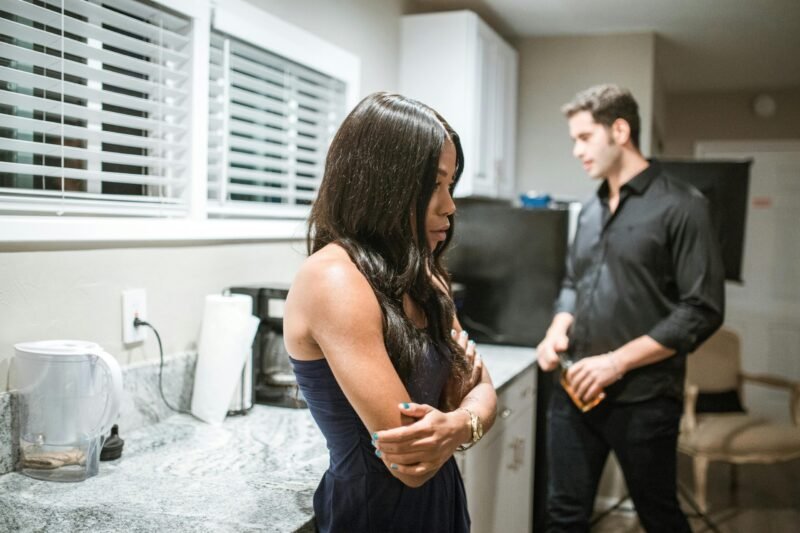Intimacy in a relationship is not just about grand gestures; it’s the little things that truly matter.
In this article, we delve into the concept of emotional bids and how they can either strengthen or weaken your relationship.
Whether it’s a simple question, a shared laugh, or a comforting touch, understanding and responding to these bids can make all the difference.
So, let’s explore the power of these small gestures and unlock the secrets to a stronger, more fulfilling connection.
First,
What are Emotional Bids?
Naturally, these can manifest in various forms, including simple comments, questions, or nonverbal cues that signal a desire for attention and engagement.
It is basically any attempt your partner makes to try and connect with you.
For instance, one partner may share a minor achievement at work, seeking acknowledgment and understanding, while another might express feelings of dissatisfaction or worry, aiming for comfort and validation. The examples are infinite.

But where does this idea originate from?
John Gottman, a prominent psychologist and relationship researcher, was probably one of the first to study emotional bids in marital relationships extensively.
He also categorised emotional bids into two types: bids for connection and bids for assistance.
Bids for connection often involve affectionate gestures or sharing thoughts, while bids for assistance may include requests for help or collaboration.
And by understanding these dynamics, couples can enhance their communication skills and cultivate a more emotionally supportive environment.
But again, these can take on numerous forms,
When one partner makes a bid, the other has an opportunity to respond positively, reinforcing the emotional connection.
Conversely, when bids are ignored or responded to negatively, it can lead to feelings of rejection and emotional withdrawal.
Over time, those consistent negative responses to emotional bids can erode trust and intimacy, ultimately jeopardizing the relationship.
Relationships don’t typically implode in one day but usually over time.
Many couples don’t seem to pay attention to the direction in which their relationship is moving over time, only to be caught out in the end.

Now, let’s discuss
The Four Responses to Emotional Bids
Apart from the two types of emotional bids, Gottman further identified four distinct responses to these emotional bids:
- Turning toward,
- Turning away,
- Turning against, and
- Turning enthusiastically toward.
And each of these responses has unique implications for relational dynamics.
The first response, turning toward, involves acknowledging and engaging with the emotional bid.
This response typically fosters positive interaction and strengthens the bond between partners.
For instance, if one partner expresses excitement about a promotion, a turning toward response would be actively celebrating the achievement together, thereby reinforcing feelings of intimacy and support.
This behaviour usually creates a deeper foundation of trust and emotional security.
In contrast, turning away signifies a lack of engagement, where one partner either ignores the emotional bid or fails to respond meaningfully.
This response may manifest in distracted behaviour like scrolling through a phone or dismissing the other’s feelings with comments such as, “That’s nice,” and can foster feelings of disinterest, neglect and even resentment.
What’s important here, however, is that prolonged patterns of turning away can lead to emotional disconnection, highlighting the importance of positive engagement in maintaining relationship harmony.

Turning against, on the other hand, involves an active critical or hostile response to the emotional bid, which can manifest as sarcasm, dismissiveness, or outright disagreement.
For example, if one partner seeks comfort after a stressful day and the other lashes out with criticism, it creates an adversarial atmosphere. It sounds crazy, but it does happen!
Also, as you can imagine, this type of response can swiftly erode mutual respect and companionship, often leading to escalating conflict.
Needless to say, you want to avoid this kind of response at all costs.
Lastly, turning enthusiastically toward is often characterized by a supportive and engaged reaction that not only acknowledges the bid but also amplifies it, thereby enhancing connection.
A partner might say, “Tell me more about your day; I love hearing more!”
This enthusiastic engagement often builds an even more robust emotional foundation, fostering a more resilient and fulfilling relationship.
Now, I’m sharing this with you because understanding these responses can provide you with critical insights into improving interpersonal dynamics in your relationship and enhancing relationship satisfaction.
Knowledge is power if you apply it, and this knowledge here is vital to the success of your relationship.
Why?
Because there is a direct correlation between how much positivity is present in your relationship and its overall level of satisfaction.
When one goes up, the other typically follows.
The Impact of Positive Responses on Relationship Satisfaction
Research conducted by Gottman reveals a significant correlation between positive responses to these emotional bids and overall relational contentment.
According to Gottman’s findings, couples who frequently acknowledge and positively engage with each other’s emotional bids report higher levels of happiness and emotional connection.
Specifically, his studies suggest that the ratio of positive to negative interactions in a relationship should be at least 5:1 for couples to thrive.
This means that for every negative interaction, there should be five positive ones, thus highlighting the importance of fostering an environment where emotional exchanges are valued.
When partners respond affirmatively, they signal to each other that their feelings and experiences are essential and worthy of attention.
Conversely, neglecting or dismissing emotional bids can lead to feelings of loneliness, resentment, and, ultimately, a decline in relationship satisfaction.

Partners who consistently overlook one another’s emotional bids may find themselves drifting apart as emotional connections diminish over time.
In the long run, this can manifest as a lack of intimacy, misunderstandings, and increased conflicts within the relationship.
Therefore, it is crucial for couples to be mindful of their interactions and cultivate habits that promote positive engagement, thereby enhancing their emotional bonds and overall satisfaction.
Let’s close by looking at a few ways couples can adopt strategies that enhance their communication and emotional responsiveness and strengthen their relationship through emotional bids.
Strengthening Relationships Through Emotional Bids
Firstly, active listening is essential.
You’ve heard me say this plenty of times on this site.
What that means is that partners should consciously try to fully understand each other’s perspectives during discussions.
This also means putting away distractions and actively engaging with what the other person is expressing.
And using techniques such as paraphrasing or summarizing what was said are very helpful because they not only confirm understanding but also demonstrate a genuine interest in one’s partner’s feelings.
Also, expressing appreciation and gratitude for small gestures can significantly impact the quality of emotional exchanges between you and your partner.
Simple acknowledgments, such as saying “thank you” or complimenting each other about daily efforts, can reinforce positive emotional bids because they help create a climate of positivity and appreciation for each other.
This also creates a cycle of affirmation that keeps the emotional climate warm and inviting.
Building and maintaining trust is another foundational aspect of any robust relationship.
As a couple, this means striving for transparency and honesty, particularly when discussing sensitive topics.
Part of building trust involves acknowledging and validating each other’s feelings because it helps establish a safe space where both individuals feel valued and understood.
On top of it all, nurturing intimacy is another long-term investment in your relationship you must prioritise.
Many couples are civil and kind to each other but not necessarily intimate anymore.
That might make you amicable but not necessarily intimate.
To address that, engaging in shared activities, regularly scheduled date nights, or spending quality time together can deepen your emotional connection and levels of intimacy.
Finally, consistency in recognizing and responding to emotional bids is crucial, especially in overcoming challenges in your relationship, because it builds a foundation of trust and emotional security.
When partners consistently turn toward each other’s bids, they send a message of care, support, and attentiveness, which fosters connection even during difficult times.
At the end of the day, couples can maintain a resilient partnership that withstands adversity by developing a habit of attuning to each other’s emotional needs.
Conclusion
We can say that with much certainty because these seemingly small moments of connection, when acknowledged and responded to positively, have the power to strengthen the bond between partners.
Whether through active listening, expressions of gratitude, or fostering trust, consistently turning toward your partner’s emotional bids creates an atmosphere of support and security.
And by prioritizing these efforts, couples can cultivate a resilient and fulfilling relationship that thrives despite challenges.
Ultimately, it’s the everyday interactions, not grand gestures, that determine the strength and longevity of a partnership.




